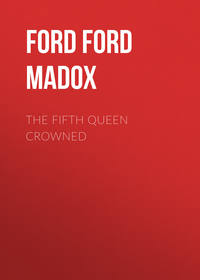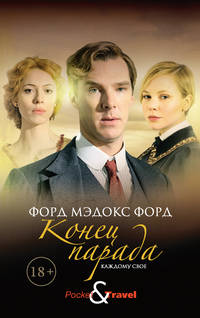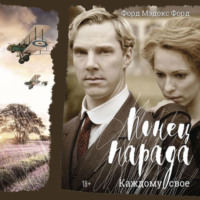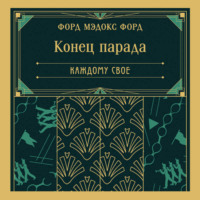 полная версия
полная версияThe Feather
Every morning regularly she got up at five o’clock to drive the cows to the pasture, and then she fed the poultry, and, if it happened to be a Thursday or Saturday, she went with the Queen to take the butter and eggs to market; besides which she had to milk the cows and cook the dinner, and all sorts of things, so that she was gradually turning into a simple country maid.
During all the five years no one from the town ever came near the house, and so you may imagine how surprised she was one morning when she got up and opened her bedroom window to see a man coming across the clover-field towards the house. She watched him come right up to the door, and then, when she heard him knock, ran down to tell the King and Queen that a man was knocking at the door.
‘Who on earth can it be?’ asked Abbonamento.
‘It’s not the tax-collector, is it?’ asked Araminta.
‘Oh no, it’s not him; he’s an old man, and this one is quite young,’ answered the Princess.
‘Nor the water-man?’
‘No, it’s not him either. There he is knocking again.’
Indeed, the knocking was becoming quite furious.
‘He’s a very impatient young man, whoever he is,’ said Abbonamento. ‘You’d better go and tell him not to make such a noise. Let him in – be quick, or he’ll knock the door down!’
And it seemed so likely, that Ernalie ran down as fast as she could and opened the door.
‘Why can’t you open the door faster?’ said an angry voice; and then Ernalie saw a young man looking at her in a state of great surprise. ‘Why, who are you?’ he asked. ‘Is this not the house of their Majesties King Abbonamento and Queen Araminta?’
‘They used to be King and Queen at one time,’ answered Ernalie.
‘They ought to be now,’ said the young man with a frown.
‘That’s quite another thing,’ retorted Ernalie.
‘Oh, is it?’ said he, with a smile this time. ‘But who on earth are you, if I may ask?’
‘I am Her Royal Highness Princess Ernalie of Aoland; and who on earth are you, if I may ask?’
‘I am Prince Treblo of this country,’ answered he.
‘I suppose you are the son of King Mumkie, then?’ said she.
‘Good gracious, no!’ said the Prince.
The Princess was just about to say, ‘Then whose son are you?’ when the old King burst into the room. He had evidently got up in a hurry, and he was only attired in his flowered dressing-gown.
‘My long-lost chee-yld!’ he exclaimed, as he threw himself into the stranger’s arms. ‘Araminta! Araminta! come along, it’s Treblo.’
And the Queen came rushing down in haste, as you may imagine. Over the rest of this affecting scene we will draw a curtain – that’s what they generally do with affecting scenes – in books, at least.
The Princess Ernalie easily perceived that she was a little – as the French say —de trop; that is, finding that ‘three was company and four none.’ So she left the room and went upstairs to comb her hair and wash her face and hands, and make herself look smart generally; for she thought that would be only right on the day on which the eldest son of the house came home – especially as he was very handsome.
Now it happened that as she was bending down to pick up her best shoes from under her toilet-table, one of them had gone a little far back, and as she drew it out she noticed that something lay behind the shoe, and she drew that out too. You may perhaps remember that she had picked up out of the road an eagle’s feather which Wopole had let fall as he hurried by with the eagle on his back. Well, then, it was this feather that she now drew out from under the toilet-table. It had lain there since she had first entered the room five years ago. Now this doesn’t say much for the cleanliness of the floors, but in those unsophisticated days they never thought of sweeping any hidden spot in the floor. This habit, curiously enough, survives even now among some people. However, to return to the Princess Ernalie.
When she picked up the feather she stood upright again and examined it carefully.
‘Why, how nice,’ she said. ‘It’s the old eagle’s feather. Now that’ll come in handy; my hat rather wanted a new feather, and it’ll just suit the colour of my hair and eyes.’
So she went to the looking-glass and held the feather close against her hair. But to her astonishment nothing was to be seen in the glass – not a vestige of herself; it seemed as if she had vanished altogether.
‘Why, what’s the matter with the glass?’ she said. ‘Something seems to have gone wrong with it.’ So she put the feather on the table and went to rub the glass, but when she looked at it she was there all right again.
‘That’s queer,’ she thought; ‘I can’t have been right in front of the glass.’ So she took up the feather and went in front of the glass. This time she saw herself very well, but as soon as the feather touched her hair she vanished just as before.
‘Good gracious!’ she said; ‘what is the matter with the glass?’ So she tried again, and the result was always the same – whenever the feather touched her hair she vanished. ‘It must be something the matter with the feather.’ So she examined it quite closely, and she found rolled round the quill end of it a small piece of paper on which was written:
‘Guard well the feather, for whoso toucheth his hair therewith – though he be but feather-brained – shall be invisible, yet shall he see all.’
Ernalie read it over once or twice from beginning to end.
‘The writing says “his” hair; but it seems to act just as well with “her” hair – that is, my hair. What fun I shall have now. I think I’ll try it on at once on the King. But then, it might frighten him. No, I’ll wait, and try it on Treblo; and that reminds me I think that they’ve had enough of it all to themselves now. I’ll go and see if I can do anything for them.’ So she locked the feather up in one of the drawers, and then, putting on her shoes, went downstairs.
Now it happened that just as she had almost reached the bottom step her heel came out of her shoe, and as she stopped to put it firmly on again she heard the voice of the stranger saying:
‘By the bye, mother, who was that girl who opened the door to me?’
‘Oh! that’s Ernalie,’ answered the Queen’s voice.
(It seemed as if the shoe took some time to get on again.)
‘So she told me; but who is Ernalie?’ he asked again.
‘Oh! you’d better get her to tell you that too when she comes down. Well, what do you think of her?’
‘Oh, she’s – she’s just lovely,’ answered he.
(‘Listeners never hear any good of themselves,’ thought the Princess. However, the shoe had come on just at that moment, and she entered the room.)
‘Speak of the – ahem!’ the King was just saying, when the Prince interrupted him.
‘“Speak of angels, and you hear the rustling of their wings,” you mean,’ he said.
‘Thank you for the compliment, if it was meant for me,’ said the Princess.
‘Oh! don’t mention it – it’s nothing when you’re used to it,’ said Treblo, who, to tell the truth, seemed rather confused.
‘And are you used to calling young ladies angels?’ said his father sharply. ‘I suppose it’s some of the foreign manners you’ve learnt.’
‘Suppose we change the subject,’ retorted his son, and the subject was changed.
Ernalie retired again. She wanted to look after the dinner, so that it might not be late, and so nothing else in particular happened, for Treblo went round the farm with his father, and Araminta went into the kitchen to help Ernalie with the dinner. When the goose was turning on the spit, and the apple-tart had been put into the oven, the Princess had time to ask some questions about Treblo, and the Queen told her that he had been sent out of the way by Mumkie, in order that he might not attempt to put his father on the throne again; but after seven years he had come back safe, having had all sorts of adventures, and he now felt quite confident that he would be able to restore his father, for he was very popular with the army that had just returned from the war, and as to the people of the town, they cared very little who was king – in fact, they rather preferred Abbonamento to Mumkie. So Araminta was quite cheerful over it, for she much preferred living in a palace to living in a cottage.
Things went merrily through the day, and at dinner-time they drank the health of the King and Queen of the country, and altogether they seemed very happy. After dinner the King composed himself for his afternoon nap, and the Queen took down a volume of sermons and began to read. Ernalie went out to milk the cows and take the eggs from the hens’ nests. As to the Prince, he said he was going out to take a walk.
Before going out the Princess slipped up to her room, and took the eagle’s feather from the drawer where she had locked it up. She intended to try if she were invisible to the cows and poultry. So she put it in her sunbonnet and went out. It really seemed as if it was quite correct about the feather, for as soon as she got out of the door a bee ran right against her, and then a sparrow that was chirping on a rail allowed her to catch hold of it before it took any notice of her approach. However, she let it go, and it flew away, looking very astonished indeed, as you may imagine.
She reached the pasture, and opened the gate, calling to the cows:
‘Daisy, Daisy; come, Lightfoot; Cherry, come!’
The cows looked up from the ground, and came towards the gate, looking very astonished indeed; but when they got quite close and saw no one they stopped, and however much she called them they refused to move.
‘This will never do,’ she said; ‘I must really let them see me, or they won’t come.’
So she took the feather from her bonnet, and called again. This time the cows seemed quite ready to come, and they trotted along to the gate and crowded round her to be stroked. So she shut the gate again and told the cows to go on – for they understood her quite well – and then she went on after them. When they got to the dairy she milked them one after the other as they came in their regular order to the stool. She was milking the last one – Cherry, the best of them all – and she leaned her face against its side, and listened to the ‘thud, thud,’ of the milk as it streamed into the pail with a foam like the sea in a rage. She was in fact almost lulled to sleep by it, when she was startled by a voice behind her. It was so sudden that she almost upset the milk-pail in her fright.
‘It seems to be easy work milking,’ said the voice, and she looked round and saw it was the Prince, who had come quietly up behind, and was leaning over the fence at her back, looking on lazily at her.
‘Oh! how you startled me, Prince,’ she said.
‘Did I?’ he answered. ‘I am very sorry for that; but you needn’t call me Prince yet. I’m not a Prince, you see, and then you’re the adopted daughter of my parents, so you ought to call me your brother.’
‘Oh, really!’ said she. ‘However, you soon will be a Prince, and then I shan’t be able to call you brother, shall I?’
‘Why not?’
‘Because you will be a Prince, and I am only a dairymaid.’
‘But you’re a Princess, aren’t you?’ he asked.
‘I was a Princess once,’ she said, with a sigh; ‘but – ’
‘You shall be again,’ he said.
‘But how do you know?’ she asked.
‘I know – oh, well, let’s change the subject. As I said before, it seems to be easy work milking. You might let me try?’
But she said:
‘It wouldn’t be any good. Cherry wouldn’t let any one but me touch her. Besides, I’ve just done, and I’m going to carry the pails to the house.’
‘Let me carry them for you?’ he said quickly.
‘Oh, thanks; if you’ll take two, I’ll take the other two, and thus we shall do it all in one journey,’ she answered.
So he did as he was told, and the pails were put safely in the house.
‘Now I must go and get the eggs,’ she said.
‘Can I be of any use?’ asked the Prince.
But she answered:
‘Oh no, there’s nothing for you to do, thanks.’
But he went with her all the same. I suppose he thought he might be of some use. So she let him hold the basket for her, and the eggs were also put safely in the house. Just, however, as he had put them down, a shrill whistle sounded twice from behind the garden hedge, and the Prince said:
‘Oh, that’s a friend of mine. You must excuse me for a few moments,’ and he went towards the hedge.
‘I wonder who his friend is,’ she said to herself. ‘I think I’ll put the feather on again and go after them. It would be a good way of trying my feather on men.’
So she took the feather out of her pocket again, and put it in her bonnet, and then ran after him. He had got over the fence some time before she reached it, but he was still in sight on the other side, and with him his friend was walking. He seemed to be a soldier, so far as she knew. They were talking very earnestly; but, from where she was, she was not able to hear what they said. So she too got over the fence, and went towards them; but she reached them rather too late to hear anything much that they did say. What she did hear was this, from the soldier:
‘Then you will come to-night at half-past twelve?’
‘Yes,’ answered the Prince.
‘We’ll have everything ready, and it will be easily done. If I were you I wouldn’t tell the King or Queen, it would only make them nervous, and we’re sure to succeed.’
‘Very well,’ said Treblo; ‘at half-past twelve.’
(‘Half-past twelve,’ thought the Princess; ‘what on earth is he going to do at that time of night? It sounds funny. I think I’ll go with him to look after him.’ For, you see, Ernalie was rather inquisitive, as you may have found out by this time.)
So the soldier went one way, and Treblo went back to the house whistling ‘When the king shall enjoy his own again.’
But the Princess ran on in front of him and reached the house first, so that by the time he was there she had taken the feather out of her bonnet and was quite visible again.
He came in quite naturally, as if nothing had happened, and the rest of the day went off quietly enough.
They went very early to bed at the farm, and the house was quiet by half-past eight.
Just before they went to bed Ernalie asked the Prince:
‘Do you like walking at night much?’
‘It depends upon the night very much,’ he answered.
‘Such a night as this, for instance,’ said she.
‘Oh yes – “a moonlight night for a ramble,” don’t you know?’ he said, laughing.
‘About half-past twelve, I suppose.’
The Prince looked astonished and shocked.
‘Half-past twelve!’ he said, with his eyes wide open; ‘why, I’m never out after eight. My mother says the night air’s not good for me.’
‘Oh, is that it?’ said the Princess. ‘However, I’m tired; good-night.’ And she went to her room and lay down on her bed with all her clothes on. It was rather hard work keeping awake for such a time, but at last she heard the kitchen clock strike twelve, and she knew it was twenty past. So she got up as quietly as possible and put on the feather, for, you see, she didn’t want any one to see her. It seemed very ghostly getting up so late at night, and although she stepped very lightly, the stairs creaked loudly. She went into the sitting-room and sat on a chair waiting for the Prince to come down. She had to wait close on half an hour; for, you see, the Prince had heard the clock strike too, but didn’t know it was twenty minutes slow. However, at last he came downstairs holding the candle in his hand. He hadn’t put his boots on for fear of waking any one, and so he, too, sat down on a chair to put them on. This was rather unpleasant for the Princess, for of course she had to keep as quiet as a mouse for fear of making him suspicious; for, you see, it was so quiet that the least breath she took could be heard. At last the putting on of his boots was finished, and he stood up, saying to himself out loud, ‘Now, where’s my hat?’ and then he looked straight at the Princess and said, ‘Ah, there it is,’ and he began to walk towards her.
‘What can he want?’ thought the Princess; and then she looked down at the chair – for, you see, she could see right through herself – and she discovered she was sitting on his hat. By this time he was quite close to her and bending down to pick his hat up, so she jumped sideways off the chair as fast as she could; but even then, as he put his hand out, he caught hold of hers, which had not time to get out of the way. As soon as his hand closed on it, however, he let go as if it had stung him.
‘Good gracious! what is that?’ he said in astonishment. And he did look so funny that she had hard work to keep from laughing at him. However, he calmed down in a minute, and again tried to take up his hat. This time you may be sure that the Princess’s hand was no longer there, for she had taken herself and it over to the other side of the table. So he took up the hat and looked at it.
‘Looks as if it had been sat on,’ he muttered. ‘Just like ’em; people always do sit on my hat if they can.’ However, he pushed it out straight again and looked at his boots to see if the laces were quite tight; and then he blew the light out, seeming, by the noise he was making, to be trying to get out of the door. When she heard him in the passage she thought it was about time to follow him. So she tried to do it, making as little noise as possible; but although she did try very hard she did not succeed very well, for she fell right over a chair and made noise enough to be heard all over the house.
‘What on earth’s that?’ she heard the Prince ask, and then he lit a match to look. But he didn’t see anything, and the light allowed the Princess to get quite close to him without upsetting anything more, and he opened the door, letting the moonlight shine in clear and white. While he was standing at the door she managed to slip past him into the open air, and there she waited for him. He wasn’t very long coming, and then she followed him down the garden, keeping to the grassy edge, and not walking on the path for fear of the noise that her feet would make on the gravel. They reached the field and then the road, and the Prince was joined by the other man whom the Princess had seen before. This man – whom, by the bye, the Prince called Ablot – was dressed in complete armour, and he carried another suit, which the Prince proceeded to put on.
(‘This begins to look exciting,’ thought Ernalie. ‘Perhaps he’s a highwayman, or a footpad – anyhow, I mean to keep up with them.’)
So she walked on faster, for she had fallen a little behind. When she got up with them she heard the Prince say:
‘Well, we’ll surround the Palace, take Mumkie prisoner, and turn him into the market-gardener; and then we’ll proclaim it to the rest of the citizens that my father and mother are King and Queen once more, and if they won’t give in – so much the worse for them. The soldiers are all on my side.’
The other answered:
‘Oh, but they’ll give in without the soldiers. They’re not at all fond of Mumkie. He has made himself very unpopular of late. You see, he put a farthing on the income tax, and he’s raised the price of everything that begins with “S,” like “sausages” and “sealing-wax” and “soap” and “sewing-machines.” Now your father only raised the price of things that begin with “Z,” and there aren’t many “Z’s,” you know; there’s “zebras” and “zeal,” and you can’t make much out of selling zeal.’
(‘Ah, that’s what you’re up to!’ thought the Princess. ‘We ought to have some fun then.’)
However, they were walking too fast for her to think much. All she could do was to keep up, and that she did to the best of her power, until at last they reached the middle of the town, where the King’s Palace stood. Here they halted to take counsel.
‘You wait here while I go and fetch the men,’ said Ablot, and as the Prince made no objection, he went and left him standing in the moonlit square. As Ablot seemed gone rather a long time, the Princess thought she would have a little fun, and going close to the Prince she whispered in his ear:
‘Does your mother know you’re out?’
The Prince turned round once or twice, as if to assure himself that there was no one hiding behind his back; but as he could see no one, he simply said:
‘I beg your pardon.’
‘That’s very good of you; but I thought you were never allowed out after half-past eight o’clock. I heard you tell Ernalie so this evening. I’m afraid you told a fib.’
The Prince looked very astonished.
‘Who or what are you?’ he asked.
‘Never you mind. I’ve a good mind not to let you succeed this evening, because you deceive not only your old mother who is asleep at home, but you have also told a fib to that innocent girl, of whom I’m very fond.’ (‘That’s quite true,’ thought the Princess. ‘I’m very fond of myself.’ And so she was.)
The Prince looked astonished.
‘How on earth could you know that?’ he said.
‘I heard it, I tell you.’
‘But there was no one in the room except the Princess and myself.’
‘All the same, I heard every word you said, and, what’s more, I shall hear every word you ever say to her,’ answered the Princess.
‘Well, then, you’ll be a great nuisance,’ said the Prince angrily.
‘Very well, I’ll tell the Princess all that you say, and I’ve a good mind not to let you succeed, as I’ve said before.’
‘Then you’ll do the Princess a great deal of harm if you do.’
‘Why?’
‘Because she’s – she’s – ’ he began.
‘She’s what?’ asked the voice.
‘Oh, well, never mind.’
‘But I do mind,’ said the voice.
‘“She’s all that fancy painted!” if you want to know so much,’ said the Prince.
‘But I don’t see how that’ll make any difference to her in case you should succeed,’ said the voice.
‘You’re uncommonly dull if you don’t see it,’ said the Prince, who was beginning to feel bad-tempered over being cross-questioned thus.
‘Don’t be rude, or you shan’t succeed,’ said the voice.
‘If I don’t succeed the Princess will never become Queen of the kingdom.’
‘How can she become Queen of the kingdom? – it would have to be a queendom. And I don’t see, if you do succeed, how she is to become Queen!’
‘As I’ve said before,’ said the Prince, ‘you’re excessively dull if you don’t see.’
‘I shall tell her what you said.’
‘Oh, do anything you like, only leave me alone, do,’ said the Prince, who by this time was quite in a temper.
So she let him alone, and made no answer when he wanted her to talk again. However, in a few minutes Ablot came into the square, followed by a large number of men, whom she heard him command to surround the Palace, which they accordingly did; and then, choosing five men, he and the Prince entered the Palace, Ernalie following them, for she didn’t know exactly what else to do. The first of the Palace guards they came to was fast asleep, and they did not molest him; but the second one was awake, and so was the third one. These two made some resistance, but they were soon knocked down and bound; but that was not much good, for they made such a noise that they would soon have brought the household about their ears, only it happened to be Saturday and all the servants were having a half holiday, and the only effect of the shouting was to bring King Mumkie out on to the landing. He had been sitting up to let the servants in when they came home, and he was in rather a bad temper.
‘What the deuce are you making such a noise for?’ he shouted to the guards.
But as the guards had been gagged by this time, they could only gurgle hopelessly.
‘Why don’t you answer?’ roared the King. But the guards made no reply, and the King came running down to see what was the matter. He was holding a candlestick above his head, and the light that fell on his face showed that he was in a very great rage indeed. When he saw the Prince in the hall he stopped, and said:
‘What do you want making this unearthly row at this time of night? Every one’s in bed, and I shall catch my death of cold coming down in my dressing-gown into this cold hall. Now, just go off – do, and leave me alone.’
‘I shall not,’ answered the Prince.
‘Why not? What do you want at this time of night?’
‘I want the throne!’
‘Then you can’t have it; it’s a reserved seat, and I’ve taken it already.’
‘But what right have you to it?’
‘I’m the sovereign,’ said Mumkie.
‘You’re a false coin then – you’re not half a sovereign!’
‘I’m quite as good as the last sovereign. He’s lost the crown, so he’s only worth fifteen shillings.’









